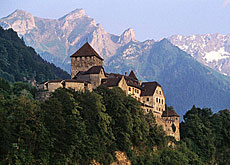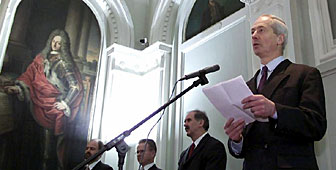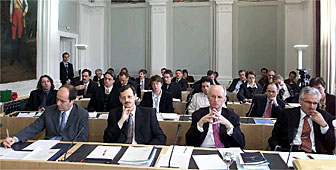Liechtenstein marks 200th birthday

Swiss President Moritz Leuenberger is in neighbouring Liechtenstein for celebrations to mark the principality's 200 years of independence.
The tiny state has adopted much that is Swiss, including the currency, the postal service and similar tax and banking rules. But it draws the line at importing Swiss democracy.
Liechtenstein’s “Day of Sovereignty” on July 12 is the culmination of its bicentennial festivities, which include an official ceremony, a parade by its 11 municipalities, a dinner for guests of honour and a street party in the capital, Vaduz.
The small mountain principality maintains extremely close economic, political and diplomatic ties with its Swiss neighbour.
“We both have strong identities that are manifested in different democratic cultures and political institutions,” the Swiss president stated on the eve of his visit.
The two countries’ histories are inextricably interlinked. Liechtenstein participates in a customs union with Switzerland and has used the Swiss franc as its national currency since 1923.
Liechtenstein is often represented by the Swiss diplomatic service abroad. Both countries use the same postal service and Liechtenstein football teams even play in the Swiss football leagues.
Europe
Over the years the small alpine nation has fought hard to maintain its sovereignty and independence. To do so, it has been forced to seek out partners, rely heavily on its neighbours and integrate into various supranational organisations.
“To defend its sovereignty, a small nation has to find a balance between self-determination and voluntary cooperation,” Otmar Hasler, Liechtenstein’s prime minister, recently told Switzerland’s Neue Zürcher Zeitung newspaper.
Liechtenstein set itself apart from Switzerland by voting in 1992 to link up with the European Union through the European Economic Area (EEA).
National officials insist its future is closely tied to the continent’s integration process. “We are a minute part of Europe, but our heart beats with it,” says Rita Kleber-Beck, Liechtenstein’s foreign minister.
Liechtenstein was admitted to the United Nations in 1990. Switzerland only joined in 2002.
Banking
The 160km² landlocked country, which was a poor farming community well into the 20th century, suffered economically during the world wars despite its neutrality.
It then aligned itself with its neutral western neighbour and after the Second World War focused on its financial services industry, rapidly getting rich on its status as an offshore tax haven, with strict rules on banking secrecy.
Today, almost a third of its gross domestic product of SFr4.2 billion ($3.4 billion) comes from financial services, including banking.
Low business taxes – the maximum tax rate is 18 per cent – have encouraged around 75,000 so-called “letter box” companies to establish nominal offices in Liechtenstein. But like other tax havens, the principality has come under heavy international financial scrutiny.
Its banking sector was shaken in 1999 when it was blacklisted over reluctance to join the fight against money laundering.
Reforms
After introducing radical reforms, Liechtenstein was taken off the list and by the end of 2005 its banks were managing almost SFr150 billion in foreign funds, while its international insurance business soared.
As in neighbouring Switzerland, tax evasion is not a crime. The principality does not provide legal assistance to other countries investigating alleged tax evasion and wants to maintain as much of its banking secrecy as possible.
The government admits that it has had a big problem with its image, but insists that it is working on it, with the country likely to join Europe’s “Schengen” zone, which allows passport-free travel across borders while also increasing the exchange of information between national authorities.
For the bicentennial celebrations the national parliament, the government headquarters and castle are getting a face-lift and Liechtenstein’s image for the outside world is also being spruced up.
A new national brand has been created to raise its international profile: a crown composed of five symbols displaying the diversity of Liechtenstein’s achievements in finance, business, tourism, sports and culture, and its pride in its “entrepreneurial Princely House”.
swissinfo with agencies
The Principality of Liechtenstein is a small, landlocked country with a population of 34,000, sandwiched between Switzerland and Austria.
The mountainous nation has existed since 1719 but became a sovereign country in 1806.
Liechtenstein’s population is essentially ethnic German, though its resident population is approximately one third foreign-born, primarily German-speakers from Germany, Austria and Switzerland, and other Swiss nationals, Italians and Turks.
Despite its small geographic area and limited natural resources, it has developed into a prosperous, highly industrialised, free-enterprise economy, mainly thanks to its financial services sector and tax haven status.
The country’s population enjoys one of the world’s highest standards of living, comparable with that of Switzerland.
The “Day of Sovereignty” on July 12 is the culmination of the different events organised to mark Liechtenstein’s bicentennial.
The day includes an official ceremony, a parade of the 11 municipalities, a festival dinner for invited guests of honour and a party in the capital, Vaduz.
Other highlights of the anniversary festival are a traditional circus held at the beginning of September in Eschen, and a sports event at the Eschen-Mauren stadium on June 18.

In compliance with the JTI standards
More: SWI swissinfo.ch certified by the Journalism Trust Initiative


You can find an overview of ongoing debates with our journalists here . Please join us!
If you want to start a conversation about a topic raised in this article or want to report factual errors, email us at english@swissinfo.ch.